The 20th century is full of examples of dictators in Europe, America, Africa and Asia.
These are leaders who came to power, sometimes through democratic means or by forcibly overthrowing a constituted regime. They wanted to build a "new society", and for that, they committed crimes against humanity.
Left or right, we present a list of 15 dictators of contemporary history.
1. Adolf Hitler (1889-1945)
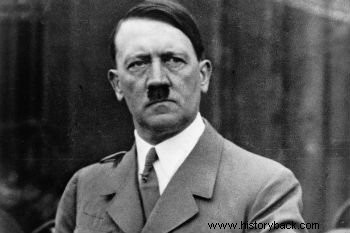
President and Chancellor of Germany, Adolf Hitler was a precursor of Nazism, conceived and fought the Second World War (1939-1945).
Austrian by birth, Hitler went to Germany in search of a better life. He fought as a soldier in World War I. He accompanied the two empires, the German and the Austrian, which crumbled after defeat.
This fact will shape his political attitude, as he joins those who blamed the German defeat on communists, Jews and international capitalists. With some companions, he plots the Munich Coup, but is defeated and imprisoned. There, he would summarize his ideas in the book "My Struggle".
Hitler defended the idea of the superiority of the Aryan race and, therefore, tried to eliminate all those he considered inferior such as Jews, Gypsies, physically and intellectually disabled, homosexuals, etc.
For that, he created and used the Nazi concentration camps for his macabre goals. These were the main victims of Nazism. Furthermore, he led Germany to war on two fronts, western and eastern, in battles that cost the death of thousands of young people.
Realizing that Germany would be defeated, Hitler committed suicide.
Read more in Holocaust and Nazism.
2. Joseph Stalin (1879-1953)
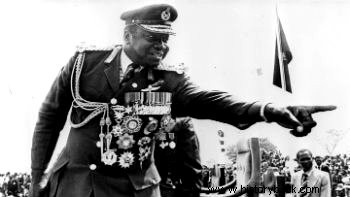
Stalin was born in Georgia. After Lenin's death in 1924, Josef Stalin came to power in the Soviet Union.
His first step was to nationalize the means of production and collectivize arable land. The objective was to reach the level of industrialization of countries like Germany or England.
Hunger crises due to misguided agricultural policies have shown the Russian people and the world the worst face of socialism. He also relentlessly pursued his enemies by exiling them, sending them to forced labor prisons known as Gulags, or killing them.
In Stalin's 30 years in power, an estimated 20 million people died.
Stalin died of natural causes in 1953.
3. Mengistu Haile Mariam (1937)
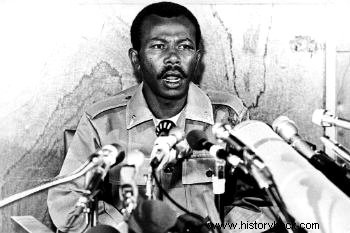
Ethiopian military and politician, also known as “Negus Rojo”. He rose to power by dethroning Emperor Haile Selassie I and installed a socialist-inspired government in Ethiopia.
His administration was marked by crimes against human rights, collective hunger, persecution of the opposition and war against Somalia.
His regime was responsible for between 725,000 and 1,285,000 deaths. In 2006, Ethiopian justice declared Mengistu Haile Mariam guilty of genocide and crimes against humanity.
Despite this, nowadays, Mengistu Haile Mariam lives in Zimbabwe.
4. Hissene Habre (1942)
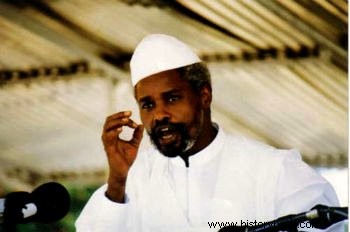
Military and political, he was president of Chad from 1982 until 1990. Hissène Habré came to power through a coup d'état that overthrew President-elect Goukouni Oueddei.
At that time, Oueddei had the support of Libya, of Gaddafi (read No. 13).
Thus, the United States and France, fearing that another anti-Western government would form in North Africa, supported the oueddei's ouster led by Habré.
During his rule, Hissène Habré committed genocide against the tribes and ethnicities that opposed him. It is estimated that the secret police tortured some 200,000 people and murdered around 40,000.
Habré received the dubious nickname "Africa's Pinochet" due to his methods of disappearing and torturing political prisoners.
Upon being defeated in 1990, he went to Senegal. After unsuccessful attempts by European justice to deport him to Belgium for trial, Senegal created a special court that sentenced him to life imprisonment.
Hissène Habré is currently serving a life sentence in Dakar.
5. Augusto Pinochet (1915-2006)
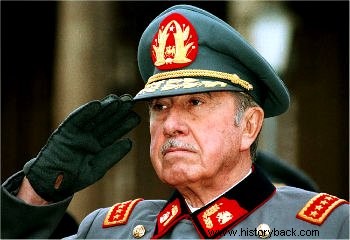
Chilean military and dictator. In 1973, he directed the coup d'état that defeated the government of President-elect Salvador Allende.
During the Cold War, the United States intervened in governments that were socialist in orientation.
Chile was experiencing important political and social changes after Allende's election. It was the first time that a leftist politician had come to power by electoral means in Latin America.
The military, led by Augusto Pinochet, declared hostility to Allende and stormed the presidential palace on September 11, 1973. Allende committed suicide and Pinochet took control of Chile.
Pinochet committed serious human rights violations such as censorship, the use of torture in interrogations and the disappearance of people. The Pinochet regime ended with more than 3,200 people missing and 38,000 tortured.
Although the Chilean authorities carried out investigations with the aim of prosecuting him, Pinochet died without going to trial.
6. Idi Amin Dada (1920-2003)

Ugandan military dictator and president Idi Amin Dada came to power with the 1971 coup d'état.
His government was characterized by the repression of freedom of expression, corruption, ethnic persecution and assassinations of political enemies.
Idi Amin Dada moved from pro-Western ideology to anti-imperialism. In this way, he got the support of Libya, the Soviet Union and East Germany.
He expelled Indians, Pakistanis and European Christians from the country in order to turn Uganda into a black-only country. The number of victims attributed to his regime ranges between 100,000 and 500,000 people.
In addition, he even had high members of his government assassinated as ministers and the Anglican bishop Janani Luwum, who denounced the atrocities of his regime.
Of megalomaniac personality, he volunteered to be King of Scotland in order to lead the Scots to defeat England.
In 1978, Idi Amin Dada declared war on Tanzania, but would be defeated by this country. Thus, he exiled himself to Libya and later to Saudi Arabia, where he would pass away after 24 years of exile.
7. Saddam Hussein (1937-2006)
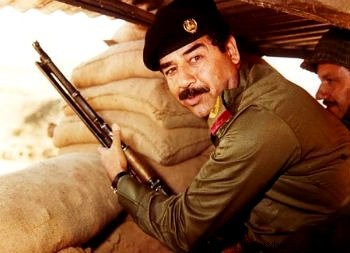
Saddam Hussein was born in the city of Tikirit and came from a poor herding family. At age 20 he joined the Arab Socialist Ba'ath Party and from there he built his career.
This party's ideology was to reconcile socialist ideas with Arab nationalism. During Saddam's government, oil companies and banks were nationalized. This drew distrust from the United States, which depended on Iraqi oil to satisfy its demand.
He also abolished the courts and Islamic law - the sharia - and this earned him criticism from the religious sectors. He also harshly repressed the Kurds and Shiites, accused of collaborating with Iraq's enemies.
Saddam Hussein's government was marked by arbitrary arrests and torture. He participated in the Gulf War and the Iraq War and is responsible for the Kurdish Genocide during the Iran-Iraq conflict.
Captured by American troops, he was handed over to Iraqi justice. The Iraqi court sentenced him to death by hanging.
Read more in Kurds.
8. Francisco Franco Bahamonde (1892-1975)
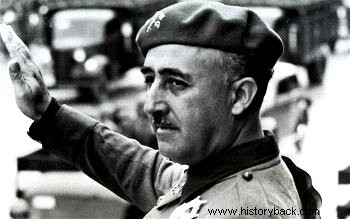
Spanish soldier and dictator, member of the coup d'état that overthrew the Spanish republic, which led to the Spanish Civil War (1936-1939). During the war, there are arbitrary arrests and summary trials.
Franco allowed the allied countries, Germany and Italy, to bomb cities like Guernica, Barcelona and Madrid. From malnutrition alone it is estimated that some 50,000 people died in Spain.
Subsequently, his regime was marked by violent persecution of opponents, censorship, rebuke to nationalisms, exile for those who had fought for the republican cause.
In forty years of government, the death penalty was instituted and 23,000 people were shot.
He died in 1975 of natural causes. To this day, Franco's memory and legacy are a controversial subject in Spain.
See also:Francoism in Spain9. Jorge Rafael Videla (1925-2013)
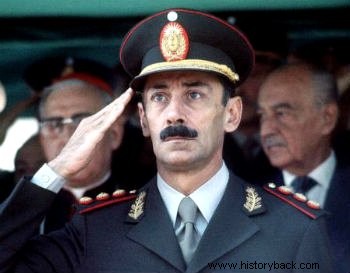
Argentine military and dictator. In 1976, after consummating the coup d'état in Argentina against President Isabelita Perón, he sowed terror throughout the country.
His regime called itself the "Process of National Reorganization" and was based on eliminating opposition through arbitrary arrests, kidnappings and assassinations. It is estimated that around 30,000 were left unaccounted for at this time.
Under his protection, some Argentine soldiers took advantage of the assets of those who were detained. They even kidnapped babies born in prisons and gave them up for adoption.
Likewise, he promoted the opening of the market, the suppression of unions and became involved in a territorial dispute against Chile. With disagreements between his comrades in arms, Videla was replaced by General Roberto Viola.
Videla was tried several times in later decades, swinging from prison to freedom. Finally, in 2010, he was sentenced to life imprisonment, where he would die at the age of 87.
See also:Operation Condor10. Pol Pot (1925-1998)
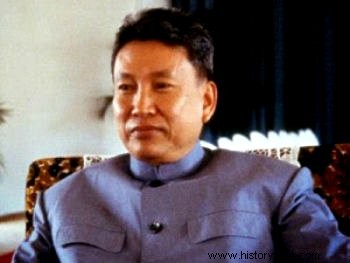
Saloth Sar, better known as Pol Pot, was a Cambodian dictator and leader of the Khmer Rouge. Attracted by socialism, especially Maoism, he took up arms against the monarchy and the Vietnamese.
Once in power, his idea was to build an agrarian country. Everything modern like machines and technology was banned from Cambodia. Intellectuals, religion and study were banned.
He also forced people who lived in cities to go to the countryside. There, they were confined in forced labor camps where they died of starvation and fatigue.
He became the main responsible for the so-called "Cambodian Genocide" which wiped out a third of Cambodia's population. Torture was used systematically and large mass graves were opened to bury the dead.
In 1979, Vietnam invades Cambodia. To combat them, Pol Pot ordered the mining of the country's fields, which has consequences to this day, as landmines continue to claim victims.
Even defeated, he retreats to the countryside where he leads the dissent. The conflict turns into a war between the government and the Khmer Rouge, still commanded by Pol Pot.
Pol Pot dies without trial for his atrocities in 1998.
11. Mao Zedong (1893-1976)
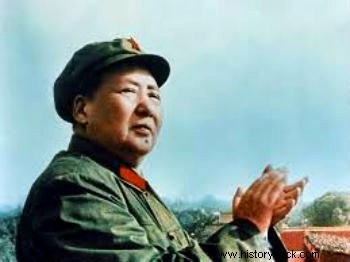
Leader of the Chinese Revolution who installed socialism in China. Its policies of industrialization and agricultural reorganization are estimated to have left 70 million dead.
Mao Tse-Tung approached the Soviet Union in order to gain external support and a market for Chinese products. He admired Stalin and imitated his methods of forced collectivization and the cult of the leader's personality, for example.
China's version of socialism was called Maoism and it inspired leftist movements around the world
He also promoted purges of intellectuals and the Chinese Cultural Revolution in the 1960s, which plunged the country into a wave of violence and arrests that cost the lives of students and opponents.
Still, he received a visit from American President Richard Nixon so as to win over Western political opinion.
Mao's legacy remains controversial. If, on the one hand, it laid the foundations for Chinese modernization, industrializing the country, on the other hand, it ended up compromising several generations due to political persecution, malnutrition and strenuous working hours.
Mao Zedong died in 1976 of illness.
12. Benito Mussolini (1883-1945)
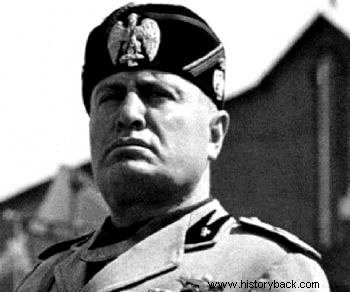
Benito Mussolini was born into a humble family in Italy and at first was enchanted by socialist ideas, for their revolutionary content.
However, resentful of Italy's defeat in World War I, he breaks with socialism. He goes on to defend fascism, extreme, violent and undemocratic nationalism as a solution to regain lost territories and pride.
In 1922, he shows the power of his Fascist Party by putting 50,000 militants to parade in the episode known as “The March on Rome”.
Like all dictators, Mussolini spared no effort in persecuting opponents, such as communists and socialists. Hitler's ally, he enacted anti-Semitic laws that resulted in the deportation and death of thousands of Jews.
Italy's participation in World War II was a complete fiasco and Germany had to intervene in every battle to help its ally. In 1943, Mussolini is deposed and arrested, but was rescued by German paratroopers.
He is still trying to found a republic in northern Italy. Expelled, he would try to cross the Swiss border, but is discovered and shot in 1945.
13. Muammar Gaddafi (1942-2011)
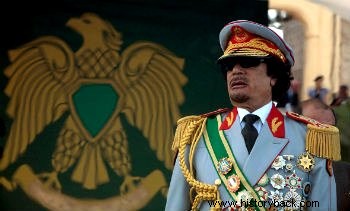
Libyan politician, military and revolutionary. He overthrew the monarchy through a coup d'état and was proclaimed the leader of the country.
He used the profit from oil production to modernize Libya by building houses, promoting free education and healthcare. Under his command the country had the highest HDI in Africa.
A practicing Muslim, he did not agree with communism because this ideology was atheistic. Thus, he approached the pan-Arab ideas defended by the president of Egypt, Gamel Adbel Nasser, who sought to unite the Arab world fresh out of European colonialism.
Gaddafi was literally eliminating any internal opposition. For that, he relied on the secret police that watched and arrested Libyan citizens without needing formal charges. In June 1996, he had around 1,000 prisoners executed, accused of “opposing the regime.”
Abroad, he declared war on American imperialism. Thus, he financed several European groups that used violence to achieve their goals such as the German Baader Meinhof, the Basque ETA, the Irish IRA and Palestinian organizations.
Likewise, he promoted a series of terrorist attacks. The most notorious were the kidnapping of Israeli athletes at the Munich Olympics in 1972, which left 12 dead, and the explosion of the Pam Am 103 plane in 1988, which killed 270 people.
Despite this, Gaddhafi did not support the terrorism practiced by groups such as Al-Qaeda or the Islamic State, as he saw them as competitors.
In this way, he condemned the 9/11 attack and declared himself a friend of the Western powers. In the first decade of the 21st century he received a series of leaders from France, Spain and the United Kingdom.
However, with the Arab Spring, Libyan organizations rose up against Gaddhafi with the support of UN troops. They managed to expel him from the capital and later, the leader was persecuted as he headed for his hometown. There, he was captured and shot to death.
14. Papa Doc (1907-1971)
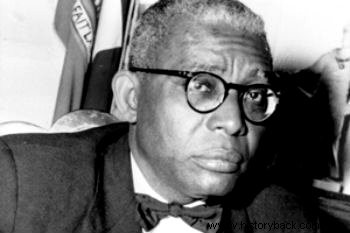
Papa Doc, nickname by which he was called François Duvalier, was a Haitian physician and politician.
He came to power through elections, but quickly became the "eternal president" of Haiti. To this end, he replaced the army commanders with men he trusted and created the "Tontons Macoute". These consisted of a personal guard that directly obeyed Duvalier.
The victims claimed by the Tontons Macoute can reach 150,000 people between murders and disappearances. Likewise, many Haitians were exiled or left the country because of political persecution.
The increase in Papa Doc's power is explained by the financial and strategic support of the United States, which feared losing yet another ally in the Caribbean, after the Cuban Revolution.
Papa Doc also knew how to use voodoo, an Afro-Caribbean animist religion, to terrorize the Haitian population. Thus, the legend was created that all those who opposed his wishes died.
Papa Doc died in 1971 from complications due to diabetes. He was succeeded by his son Jean-Claude Duvalier, the "Baby Doc" who ruled until 1986.
15. Kim Jong-un (1983)
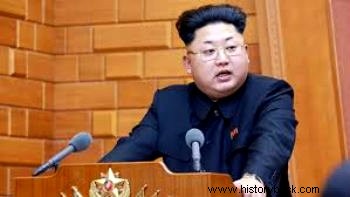
He has been North Korea's current dictator since 2011, born in Pyongyang. He is the third member of the Communist Kim dynasty to hold power.
His grandfather, Kim Jong-sum (1912-1994), was the founder of the communist state of North Korea and fought the Korean War.
As a result, the Korean peninsula was divided into two countries that followed different zones of influence. The northern one is allied with the Soviet Union and the southern one is linked to the United States.
During Kim Jong-un's rule around one million people may have died of starvation, shootings, torture and disease.
He was succeeded by his son, Kim Jong-il (1941-2011), who continued with the policies of personality cult, one-party and the closure of North Korea to the world.
Kim Jong-il was the likely mastermind of the attack on South Korean leaders carried out in Burma in 1983, where 21 people died.
Also in retaliation for the Seoul Olympics, a Korean Air plane exploded in 1987, killing 115 people.
Kim Jong-un was expected to begin opening North Korea to the world, as he had been educated in the West. However, Kim Jong-un has been as despotic or more despotic than his grandfather and father.
One of his first measures was to have his uncle killed, accusing him of spying. Then he promoted a purge of the military leadership, arresting or killing all those he thought would not be loyal to him.
Now, he is dedicated to showing the world the arsenal of weapons he possesses. This has already caused more than one international incident and has fueled conflict between the US and North Korea.
Read more :
- What is dictatorship?
- Democracy
- Civil War
- Totalitarian Regimes in Europe
- ETA:all about the Basque separatist group
